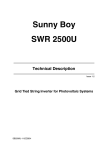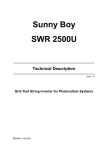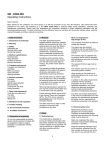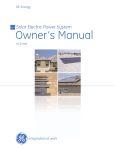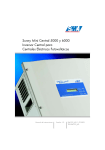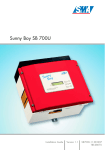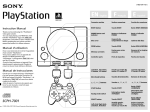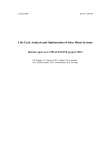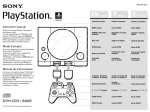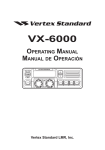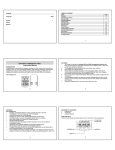Download Sunny Boy SWR 2100U
Transcript
Sunny Boy SWR 2100U Installation and User Manual Issue 1.0 Grid Tied String Inverter for Photovoltaic Systems SB2100U-11:SE0506 Sunny Boy 2100U Installation and User Manual Document Number Rev. No. Date By Description SB2100U-11:SE0506 1.0 Jan, 2006 JP First US Version SB2100U -2- SMA America, Inc. Sunny Boy 2100U Installation and User Manual IMPORTANT SAFETY INSTRUCTIONS This manual contains important instructions that shall be followed during installation and maintenance of the Sunny Boy. To reduce the risk of electrical shock, and to ensure the safe installation and operation of the Sunny Boy, the following safety symbols have been placed throughout this technical description to indicate dangerous conditions and important safety instructions. WARNING: This indicates a fact or feature very important for the safety of the user and / or which can cause a serious hardware defect if not applied appropriately. Use extreme caution when performing this task. NOTE: This indicates a feature that is important either for optimal and comfortable usage or optimal operation of the system. Follow instructions closely. EXAMPLE: This indicates an example. SAVE THESE INSTRUCTIONS SB2100U -3- SMA America, Inc. Sunny Boy 2100U Installation and User Manual IMPORTANT SAFETY INSTRUCTIONS • All electrical installations shall be done in accordance with the local and national electrical codes ANSI/NFPA 70. • The Sunny Boy contains no user serviceable parts. Please return the unit to an SMA authorized Service Center (see page 55) for maintenance. • Before installing or using the Sunny Boy, please read all instructions and cautionary markings in the technical description and on the Sunny Boy and the PV-array. • Connecting the Sunny Boy to the electrical utility grid must only be done after receiving prior approval from the utility company and performed only by qualified personnel. • Completely cover the surface of all PV-arrays with opaque (dark) material before wiring them. PV arrays produce electrical energy when exposed to light and could create a hazardous condition. • On top of the device you can find the heat sink of the Sunny Boy with potential temperatures of over 175°F (80 °C). To reduce the risk of burns, do not touch. SAVE THESE INSTRUCTIONS SB2100U -4- SMA America, Inc. Sunny Boy 2100U Installation and User Manual Table of Contents 1 Introduction .................................................................................................................6 2 Installation ...................................................................................................................7 2.1 What Must Be Done in Case of Transport Damages?.......................................7 2.2 Placement of the Sunny Boy ..............................................................................8 2.3 Electric Connection...........................................................................................12 2.3.1 Preparation of the electric connection .........................................................14 2.3.2 Connection to Electrical Utility Grid .............................................................16 3 Commissioning..........................................................................................................20 4 Operation and Failure Indication LEDs.....................................................................23 4.1 Operation Indicator ...........................................................................................26 4.2 Ground Fault Indicator......................................................................................29 4.3 Failure Indication ..............................................................................................30 4.4 Opening and closing of the Sunny Boy ............................................................35 4.5 Upgrading or modification of the Sunny Boy interface.....................................38 4.6 Measuring Channels and Messages................................................................40 4.7 Measurement Precision....................................................................................42 5 Troubleshooting ........................................................................................................43 6 Warranty Regulations and Liability ...........................................................................45 7 Technical Data ..........................................................................................................47 7.1.1 8 Minimum MPP-voltage of the PV panel.......................................................48 Appendix ...................................................................................................................55 SB2100U -5- SMA America, Inc. Sunny Boy 2100U Installation and User Manual 1 Introduction The SMA Sunny Boy is a string inverter for grid tied operation. With this manual the Sunny Boy can be installed and operated in a safe way. This installer’s guide is used as reference for the commissioning and as guideline on how to use all functions of the inverter optimally and how you can extend your existing PV-plant. Supplementary grid feeding includes the conversion of the DC-voltage from the PVpanel to grid compatible AC-voltage with so-called ”inverters“ and the subsequent connection to the electricity grid in the house distribution. Here the electricity from the PV-modules provides all consumers with electric power (household devices, lights etc.). In case that not enough power is produced the additionally necessary power is obtained from the grid. In case that there is a surplus of power, this surplus is fed into the local grid and is therefore available for other consumers. This way every single kilowatt-hour is utilized and the electricity company’s power systems are relieved. In the most simple case a PV-plant therefore consists of two basic components: the PV-panel and the inverter. Fig. 1.1: Grid tied string inverter application For a more detailed technical description of the Sunny Boy and its functionality please read “Sunny Boy 2100U Technical Description”. SB2100U -6- SMA America, Inc. Sunny Boy 2100U Installation and User Manual 2 Installation WARNING: Before installing the Sunny Boy, read all instructions and cautionary markings in the technical description and on the Sunny Boy and the photovoltaic array. WARNING: All electrical installations shall be done in accordance with all local electrical codes and the National Electrical Code (NEC), ANSI/NFPA 70. WARNING: Connecting the Sunny Boy to the electrical utility grid must only be done after receiving prior approval from the utility company and performed only by qualified personnel. 2.1 What Must Be Done in Case of Transport Damages? The Sunny Boy inverters are thoroughly checked before they are shipped. Even though they are delivered in a sturdy packaging (which can be recycled) the inverters can be damaged which is the forwarding company’s fault in most cases. Please inspect your inverter thoroughly after it is delivered. If any damages can be detected on the packaging that could lead to the conclusion that the contents is damaged or if you detect that the inverter is damaged please immediately notify the forwarding company. SMA or your local supplier can help you in this matter. In any case the declaration of transport damage must be made within 6 days upon receipt of the product and must be stated in writing directly to the forwarding agent. If it is necessary to return the inverter to the manufacturer please use the packaging the inverter was sent in. SB2100U -7- SMA America, Inc. Sunny Boy 2100U Installation and User Manual 2.2 Placement of the Sunny Boy The Sunny Boy is a sophisticated electronic device and is therefore sensitive to humidity within the case. NOTE: If the Sunny Boy is placed outside, the humidity during the installation should be as low as possible - pay special attention that it does not rain. If moisture is enclosed in the case it will eventually condense within the device which could damage the electronics. A suitable position must be found for the inverter while the PV-plant is designed. In the following you will find a summary of the most important criteria. Criteria for Installation Location: • Due to the high protection class (NEMA 4X) of the enclosure the installation is possible indoors as well as outdoors. • If possible, do not expose the inverter to rain despite NEMA 4X. • Keep the DC-cabling from the solar panel to the inverter as short as possible. • Avoid installation in the living area because a slight noise emission is possible. • Avoid mounting on resonant materials (e. g. thin wooden panels, plaster panels, etc.). The Sunny Boy tends to slightly vibrate when under load. • Provide accessibility for installation and later service. • Installation at eye-level allows easy reading of the operating LEDs or the Sunny Display. SB2100U -8- SMA America, Inc. Sunny Boy 2100U Installation and User Manual CAUTION: Please note the following points in any case: • The mounting background must be firm. • The ambient temperature must be between -13 °F and +140 °F. • The National Electrical Code (NEC) requires that the inverter be connected to a dedicated circuit and no other outlets or device may be connected to this circuit. See NEC Section 690-64(b)(1). The NEC also impose limitations on the size of the inverter and the manner in with it is connected to the utility grid. See NEC Section 690-64(b)(2). • Do not expose the string inverter to direct sunlight (if necessary install a shading roof). • A minimum distance of 8 inch (200 mm) must be clear above the inverter for ventilation, i. e. no cupboards, ceiling, etc. • Free air circulation around the case must not be obstructed. • If you are installing the Sunny Boy in a cabinet or closet etc., the air circulation must be sufficient for heat dissipation - provide external ventilation. • The heat sink can reach a temperature of more than 175 oF. • Check existing electrical installations or plumbing prior to drilling holes into the wall. • Provide a correct position of the inverter - see below: mount straight or tilted to the back never mount tilted to front Fig. 2.1: How to mount the Sunny Boy SB2100U -9- SMA America, Inc. Sunny Boy 2100U Installation and User Manual The Sunny Boy 2100U inverter is mounted on the back side with the three metal straps. Fig. 2.2: Drilling Template SB2100U - 10 - SMA America, Inc. Sunny Boy 2100U Installation and User Manual Mounting Preparation The Sunny Boy is mounted on its back side with the 3 metal straps. For that 3 screws and 3 according dowels (wall anchors) are necessary. The screws and dowels are not included. We recommend 6 mm screws and 8 mm dowels. NOTE: For outside mounting use stainless steel screws. Use a plastic washer in order to avoid scratching the paint. Fig. 2.3: Side View of Wall Mounting Metal straps for mounting: The top straps take the load, the bottom is screwed down in order to prevent the tilting off the wall. Mounting to Wall • Mark the holes with the drilling template. • Drill the holes (and put in the wall anchors), put in the screws of both top holes and screw them in until ca. 4 mm are sticking out. • Hang the inverter into the two top screws. • Fasten the bottom screw. This will prevent lifting of the inverter case. • Check the mounting of the inverter. SB2100U - 11 - SMA America, Inc. Sunny Boy 2100U Installation and User Manual 2.3 Wiring The wiring of the Sunny Boy can be done once the device is correctly mounted. Fig. 2.4: Simplified Electrical Wiring Diagram of a PV-System GFDI-Fuse DC- Connection CommunicationConnection AC- Connection Fig. 2.5: Underside view of the Sunny Boy SB2100U - 12 - SMA America, Inc. Sunny Boy 2100U Installation and User Manual WARNING: All electrical installations shall be done in accordance with all local electrical codes and the National Electrical Code (NEC), ANSI/NFPA 70. Use no. 14 AWG, minimum 90 °C (194 °F), copper wire for all connections with the Sunny Boy. Voltage drop and other considerations may dictate that larger wire sizes be used. The AC-grid and the input from the DC disconnect enclosure are connected to the inverter inside the case. Cables with wire sizes up to 10 AWG (5.26 mm2) are accepted by the AC- and DC-terminals on the printed circuit board. WARNING: The connection of the Sunny Boy to the DC-voltage from the PV string and the AC-voltage of the utility must be done in the order described here. This ensures that the disconnecting of contacts as well as hazardous voltages during the installation are avoided. • Connect the Sunny Boy to the electricity grid • Connect the PV strings to the DC disconnect enclosure • Connect the DC disconnect enclosure to the Sunny Boy • Connect the utility by switching all breakers ON To disconnect the Sunny Boy from the system, first turn all breakers and switches OFF. Then disconnect the various conductors in the reverse order listed above. SB2100U - 13 - SMA America, Inc. Sunny Boy 2100U Installation and User Manual 2.3.1 Wiring Preparation Remove all screws (1 - 4, size M5 (see Fig. 2.6)) and take off the lid. When removing these screws, be sure to save the special lock washers and reinstall them to properly ground the front panel. 4 1 2 3 Fig. 2.6: Front View of the Sunny Boy 2100U You now have the opened Sunny Boy in front of you (see Fig. 2.7) and can see the position of components and clamps relevant for you. You will find: • The internal grid fuse WARNING: A defective grid fuse has to be replaced only with same types and rating of fuse in order for continued protection against risk of fire. The type is Littelfuse 314015 15 AMP 250V AC. • The control system board with the socket for the Piggy Back board for the communication • Terminal for the AC-connection • Terminals for the DC-connection SB2100U - 14 - SMA America, Inc. Sunny Boy 2100U Installation and User Manual AC-Connection Grid Fuse Resistors Place for Piggy Back DC-Connection Fig. 2.7: Interior of the Sunny Boy 2100U SB2100U - 15 - SMA America, Inc. Sunny Boy 2100U Installation and User Manual 2.3.2 Connecting to the Utility Grid The Sunny Boy must be connected to the grid with 3 cables • With two phases (L1) and (L2) and one equipment-grounding conductor(Protective earth (PE)). WARNING: Make sure the main 240 V breaker in the main utility breaker box is switched OFF before you connect the AC terminal block. The grid impedance value at the connection point should be as low as possible to avoid an increase of the AC-voltage to non-permissible values while the Sunny Boy feeds to the grid. This also results in a higher system efficiency. EXAMPLE: The impedance is the sum of the electricity grid impedance at house distribution and all impedance values of cables and clamping points. NB: Impedance values are • ca. 0.44 Ω for a 70 feet (16.4 m) cable with a cross section of AWG 14 • ca. 0.40 Ω for a 100 feet (33 m) cable with a cross section of AWG 12 • ca. 0.43 Ω for a 175 feet (57 m) cable with a cross section of AWG 10 The total impedance of the grid plus the interconnecting ac cables and connections must be less than 1.25 Ohms. SB2100U - 16 - SMA America, Inc. Sunny Boy 2100U Installation and User Manual L2 L1 Ground AC conduit and wiring Fig. 2.8: AC Connection Terminals • Connect the main 240 Volt AC-breaker box to the Sunny Boy by a 1/2“ conduit. • Insert the conduit fitting in the very right opening of the Sunny Boy. Fasten the fitting on the inside of the Sunny Boy with the nut. • Pull the wires through the conduit into the interior of the Sunny Boy. • Connect the wire L1 to the terminal labeled L in the Sunny Boy (see Fig. 2.8). • Connect the wire L2 to the terminal labeled N in the Sunny Boy. • Connect the equipment-grounding conductor to the terminal labeled PE in the Sunny Boy. • Torque wires with torque of 35 in-lb. • Ensure all connections are correctly wired and properly torqued. SB2100U - 17 - SMA America, Inc. Sunny Boy 2100U Installation and User Manual Connection of the PV-Array to the DC Disconnect WARNING: Completely cover the surface of all PV-arrays with opaque (dark) material before wiring them. PV-arrays produce electrical energy when exposed to light and could create a hazardous condition. Depending on the type of PV-module used it is possible to connect one single string or several parallel strings. Therefore there are three connections for both the + and the - pole. Within the device these connections are connected in parallel each. WARNING: Before connecting the connectors of the PV-panel to the DC disconnect enclosure check the correct polarity and admissible PV-panel voltage between the + and the - cable connectors of the PV-panel. The PV-panel open circuit voltage must be below or at most equal to 600 V DC (VPV ≤ 600 V DC) under all conditions. Please read chapter 7.1.1 SB2100U - 18 - SMA America, Inc. Sunny Boy 2100U Installation and User Manual Connection of the Sunny Boy to the DC Disconnect • Install the DC conduit from the DC disconnect enclosure to the Sunny Boy. • Insert the conduit fitting in the left opening of the Sunny Boy. Fasten the fitting on the inside of the Sunny Boy with the nut. Do the same at the DC disconnect. • Ensure all circuit breakers in the DC disconnect enclosure are in the OFFposition. • Route the wires from the DC disconnect enclosure through the conduit and into the Sunny Boy. • Connect the positive (+) wire to the terminal block labeled with (+), see Fig. 2.9. • Connect the negative(-) wire to the terminal block labeled with (-), see Fig. 2.9. • Torque wires with torque of 35 in-lb . • Ensure all connections are correctly wired and properly torqued. Positive plug Negative plug DC- conduit and wiring Fig. 2.9: DC Connection Terminal SB2100U - 19 - SMA America, Inc. Sunny Boy 2100U Installation and User Manual 3 Commissioning Safety Notice NOTE: Make sure that nothing is on top of the heat sink of the Sunny Boy when it is running. WARNING: The heat sink can get very hot - i. e. over 175 °F (80 °C). NOTE: Make sure that all fittings are sealed and all openings on the bottom are closed with the seals. • When putting the lid on make sure the seal in the inner side of the lid is placed correctly. When screwing the inner screws make sure that the thread in the Sunny Boy case is not damaged by tilted screws. Under certain conditions the enclosure type NEMA 4X cannot be guaranteed any more. When mounting the Sunny Boy outside moisture can get into the device and damage the electronics. WARNING: Make sure that the lid is closed before applying power to the Sunny Boy. • SB2100U Ensure that all AC and DC wiring is correct. - 20 - SMA America, Inc. Sunny Boy 2100U Installation and User Manual Powering Up for the First Time Please follow the order described when commissioning the device. Fig. 3.1: ” provides a sequence chart for commissioning. • Switch the DC-breaker ON again so that the Sunny Boy is supplied with the DCvoltage. • The Sunny Boy switches to fully automatic normal operation. The green LED is blinking. Should the red LED still be on the GFDI-fuse is defective and has to be replaced or there is a PV array ground-fault. (You will find a description of the correct type in chapter 4.2.) Fig. 3.1: Commissioning Flowchart SB2100U - 21 - SMA America, Inc. Sunny Boy 2100U Installation and User Manual If the input voltage is high enough the Sunny Boy should start to feed inverted PVpower fully automatically to the grid, once enough power is coming from the PVmodules. The design of the Sunny Boy makes sure that its internal consumption is as low as possible. The Sunny Boy requires a maximum 7 W internal consumption which it takes from the PV-panel. If you measure the voltage of the PV-modules you must keep in mind the inverter’s internal consumption that will have an effect on your measurement with lower solar radiation. The open circuit voltage of the PV-panel will therefore not be displayed. The internal consumption is negligible for the voltage measurement with higher solar radiation. The operating state of the Sunny Boy will be indicated with three LEDs integrated into the lid. The meaning of the LEDs will be explained in chapter 4, “LED”. SB2100U - 22 - SMA America, Inc. Sunny Boy 2100U Installation and User Manual 4 LED Indicators The inverter normally operates automatically, without user interaction and without any maintenance. The inverter automatically turns itself off when a grid feeding is not possible (e. g. at night). The Sunny Boy automatically starts its grid feeding the next day once the solar radiation is high enough. The inverter goes to standby mode if the radiation and the resulting electric input energy is too low and is therefore always ready for operation. Each time the Sunny Boy starts up it runs a number of self test and safety procedures which the user does not notice. The user can obtain the inverter’s operating status from the 3 integrated LEDs on the lid (see Table 4.1: Operation indication overview). The green LED “Operation” describes the current operation of the Sunny Boy, see chapter 4.1 “Operation Indicator”. The red LED warns the user that the GFDI-fuse is defective. A description of this situation and what has to be done in that case is given in chapter 4.2. The yellow LED ”Failure“ indicates an internal or external failure that keeps the inverter from feeding the grid. The specific causes for this and how to avoid them are described in chapter 4.3 “Fault Indication”. The red and yellow LED combined indicate that the internal Ground Fault Detector and Interupter (GFDI) has detected a ground fault in the PV panel. A description of this situation and what has to be done in that case is given in chapter 4.2. SB2100U - 23 - SMA America, Inc. Sunny Boy 2100U Installation and User Manual Fig. 4.1: Front view of Sunny Boy 2100U Description of the symbols used in the following section: LED off LED on once per second LED on three times per second LED on with short interruptions (75% on, 25% off) LED on Not important SB2100U - 24 - SMA America, Inc. Sunny Boy 2100U LED indicator Installation and User Manual Operating condition Description green: red: yellow: standby (night) input voltage < 120 V green: red: yellow: initialization input voltage: 120 V ... 240 V green: red: yellow: stop changing operating condition or manually initiated condition green: red: yellow: waiting, checking grid starting conditions are being checked green: red: yellow: feeding grid MPP or constant voltage mode normal operation green: red: yellow: derating mode Reduction of power fed to the grid due to increased temperature of the heat sink green: red: yellow: insulation failure ground fault of the PV-panels see chapter 4.2 green: red: yellow: failure GFDI fuse is defective see chapter 4.2 green: red: yellow: failure internal or external failure, exact description depending on blink code see chapter 4.3 green: red: yellow: Consistent Failure A failure of the utility has occurred Table 4.1: Operation indication overview SB2100U - 25 - SMA America, Inc. Sunny Boy 2100U Installation and User Manual 4.1 Operation Indicator Standby (night) all LEDs are off The Sunny Boy is in “Standby” mode. The input voltage is too low (VPV < 120 V) for supplying the Sunny Boy control system with enough power. Initialization all LEDs are on The Sunny Boy control system is initializing. The string voltage to the inverter is between approx. 120 V and 240 V. The supply is sufficient for the system control and not quite sufficient for feeding to the grid. Data transmission is not possible. NOTE: In some seldom cases (bad weather, low solar radiation) the LEDs can go on all at once and off again. This “blinking” results from the fact that the incoming radiation is not high enough for the Sunny Boy to keep it stable. Note: This is not a malfunction! SB2100U - 26 - SMA America, Inc. Sunny Boy 2100U Installation and User Manual Stop Green LED blinks (3 times per second) Red LED off Yellow LED off The inverter has stopped operation, among other tasks the measurement electronics is calibrated. Subsequent condition is “Waiting”. “Stop” condition can be initiated by the user with the Sunny Boy Control or the program Sunny Data. The Sunny Boy remains in this condition until set to “MPP-Operation” or “Constant Voltage Operation”. Waiting, Grid Monitoring Green LED blinks (once per second) Red LED off Yellow LED off The Sunny Boy is checking the utility concerning its suitability for feeding electricity (starting voltage, starting time) and begins to monitoring. NOTE: If the Sunny Boy fails to connect to the utility 3 times in a row, it will wait for 10 minutes before the next attempt. SB2100U - 27 - SMA America, Inc. Sunny Boy 2100U Installation and User Manual Operation Green LED on Red LED off Yellow LED off all LEDs are off The Sunny Boy is feeding the local electricity grid, either in “MPP“ or in „Constant - Voltage“ operation. • „MPP“-operation (default setting): The Sunny Boy pushes the voltage from the PV-modules to the voltage with the maximum output power. • „Constant Voltage“-operation The voltage from the PV-modules can be set to a fixed value. This value is transmitted to the Sunny Boy with the Sunny Boy Control or with the Sunny Data software (The parameter is “V-Konst“). Derating Green LED blinks (75 % ON, 25 % OFF) Red LED off Yellow LED off The Sunny Boy is feeding the local electricity grid, either in “MPP“ or in „Constant - Voltage“ operation. Additionally it is in the derating mode due to increased temperature of the heat sink. SB2100U - 28 - SMA America, Inc. Sunny Boy 2100U Installation and User Manual 4.2 Ground Fault Indicator Isolation Fault Green LED off Red LED on Yellow LED on This is the result of a ground fault of the PV panel. The inverter then has to indicate this condition and disconnect from the grid. The inverter has to be reset manually, it cannot restart automatically. CAUTION: The PV-array must be inspected for ground faults. Please have a look at chapter 3 “Powering Up for the First Time”. If the ground fault of the PV panel is removed, the inverter switches from “permanent device disable” to “GFDI Fuse open” failure and the yellow LED is off. The red LED is still on. Now the following must be done: Open GFDI Fuse Green LED off Red LED on Yellow LED off The message “GFDI Fuse open” is displayed. If an intact fuse is then installed, the inverter restarts operation. The “GFDI Fuse open” failure persists in case the fuse is defective. WARNING: For continued protection against risk of fire replace only with same types and rating of fuse. The type is KLKD 1 AMP 600 V AC / DC. SB2100U - 29 - SMA America, Inc. Sunny Boy 2100U Installation and User Manual 4.3 Fault Indication Consistent Fault Operation Earth Fault Failure The yellow fault LED is permanently on. This is a failure of the utility monitoring or the automatic disconnection device MSD. The Sunny Boy has detected a failure in the disconnection device and has suppressed the utility interaction on startup. The Sunny Boy must be checked by service personnel and can only be put back to operation after a thorough checkup. SB2100U - 30 - SMA America, Inc. Sunny Boy 2100U Installation and User Manual Blinking code 2: Grid Failure Operation Earth Fault Failure 5s 3s 1s 3x 1s The yellow failure indication LED is on for 5 seconds, is out for 3 seconds and then blinks twice. The code is sent three times. If the failure persists the indication blinking code is repeated. The Sunny Boy is indicating a failure which has one of the following reasons: • Low grid voltage ( < VAC min see table 9.2) • High grid voltage ( > VAC max see table 9.2) • Low grid frequency (< fAC min see table 9.2) • High grid frequency ( > fAC max see table 9.2) • Drastic grid frequency change Check the utility (check the function of other electric consumers) and check the fuse of the mains connector to the Sunny Boy. NOTE: Have the grid connection to the Sunny Boy checked by a qualified electrician. Check the correct connection and the fuse in the Sunny Boy. WARNING: Do not forget to disconnect the Sunny Boy from the grid. Before opening the device read chapter 4.4. SB2100U - 31 - SMA America, Inc. Sunny Boy 2100U Installation and User Manual Blinking Code 3: Grid Impedance Too High (if the optional Grid Impedance Measurement is active) Operation Earth Fault Failure 5s 3s 1s 1s 3x 1s The yellow failure LED is activated for 5 seconds, remains dark for 3 seconds and then blinks three times. The code is sent three times. If the failure persists the indication begins once again. The Sunny Boy has detected a failure based on the utility impedance values. The criteria for the grid impedance is described in the section ”Islanding protection“ in the technical description of the Sunny Boy. A too high utility impedance can be the reason should this failure occur very often. The impedance can be checked with the Sunny Boy Control or Sunny Data. This failure can normally be avoided by increasing the cross section of the AC-cabling. SB2100U - 32 - SMA America, Inc. Sunny Boy 2100U Installation and User Manual Blinking code 4: Input Voltage (PV-Array) Too High Operation Earth Fault Failure 5s 3s 1s 1s 3x 1s 1s The yellow failure indication LED is activated for 5 seconds, is out for 3 seconds and then blinks four times. The code is sent three times. If the failure persists the indication is repeated. The input voltage is too high. The PV-panels are generating a voltage higher than the permissible specified voltage! WARNING: Disconnect the PV-Panels from the Sunny Boy immediately. Too high input voltage can destroy the Sunny Boy. Have the circuits of your PV-panels checked. SB2100U - 33 - SMA America, Inc. Sunny Boy 2100U Installation and User Manual Blinking code 5: Device Failure Operation Earth Fault Failure 5s 3s 1s 1s 1s 3x 1s 1s 1s The yellow failure indication LED is activated for 5 seconds, is out for 3 seconds and then blinks five times. The code is sent three times. If the failure persists the indication is repeated. The Sunny Boy is in a condition that makes it impossible to return to normal operation and is most likely defective. NOTE: The Sunny Boy has to be checked by a qualified technician. SB2100U - 34 - SMA America, Inc. Sunny Boy 2100U Installation and User Manual 4.4 Opening and closing of the Sunny Boy Normally the Sunny Boy operates fully automatically and maintenance-free. Should the device nonetheless be opened e.g. for • upgrading or modification of the Sunny Boy interface • control of internal AC-fuse follow the instructions given below. Opening of the Sunny Boy WARNING: These servicing instructions are for use by qualified personnel only. To reduce the risk of electric shock, do not perform any sevicing other than specified in this technical description unless you are qualified to do so. When working on the Sunny Boy follow the instructions below: 1. Separate the Sunny Boy from the grid by opening the 240 Volt AC-circuit breaker in the main fusebox. WARNING: Make sure the main 240V breaker in the main utility breaker box is switched OFF. 2. Switch the DC-breaker in the DC disconnect enclosure OFF. WARNING: Wait for at least 5 minutes until internal voltage has discharged after shutting down the DC-voltage on the Sunny Boy. SB2100U - 35 - SMA America, Inc. Sunny Boy 2100U Installation and User Manual 3. Take off the lid by removing screws 1 - 4 (see Fig. 2.6) on the lid (M5). You now have the opened Sunny Boy in front of you (see Fig. 2.7) and can see the position of components and clamps relevant for you. You will find: • The control system board with the socket for the piggy back board for the communication. To install the new communication components read chapter 4.5. SB2100U - 36 - SMA America, Inc. Sunny Boy 2100U Installation and User Manual Closing of the Sunny Boy • When putting the lid on make sure the seal in the inner side of the lid is placed correctly. When screwing the inner screws make sure that the thread in the Sunny Boy case is not damaged by tilted screws. Under certain conditions the enclosure type NEMA 4X cannot be guaranteed any more. When mounting the Sunny Boy outside moisture can get into the device and damage the electronics. WARNING: Make sure that the lid of the Sunny Boy is screwed tightly to the case before you start operating the Sunny Boy. • Connect the PV-panel by switching ON the DC-breaker in the DC disconnect enclosure. • Connect the grid by switching ON the main 240 Volt breaker. With sufficient power from the PV-panel the Sunny Boy should now start automatically feeding the grid. SB2100U - 37 - SMA America, Inc. Sunny Boy 2100U Installation and User Manual 4.5 Upgrading or Modification of the Sunny Boy Interface The Sunny Boy is prepared for data transmission. By simply plugging on a piggy back module it supports transmission via RS232 or RS485 interfaces. In order to install a new interface in the Sunny Boy a corresponding piggy back module has to be installed on the system control board. WARNING: Follow all relevant instructions in chapters 2.3, “Wiring”, 3, “Commissioning”, 4.4, “Opening and closing of the Sunny Boy” in the Sunny Boy manual. WARNING: The Sunny Boy works with high voltages externally and internally which can cause considerable harm to people. Only a qualified electrician may work on the device, especially open it! While upgrading the Sunny Boy interface the operator can get into touch both with electronic components and components carrying lethal voltage. Faulty upgrading can lead to damage at the device and danger to people by electric voltage. Therefore the device may only be upgraded by qualified personnel or the SMA service. WARNING: Only work on the Sunny Boy when it is disconnected from the grid and is sufficiently discharged! Follow ESD protection countermeasures when modifying the Sunny Boy: Electronic components are sensitive to electrostatic discharge. To protect them you have to be on the same electric potential. Discharge the electrostatic charge by touching the grounded case before touching an electronic component, otherwise you run a great risk in destroying your electronics. SB2100U - 38 - SMA America, Inc. Sunny Boy 2100U Installation and User Manual Open the device as described in chapter 4.4. Remove the piggy back that is installed on the system control board. • Only for installation of an RS232 or RS485 board: − Remove the light blue resistors (see Fig. 2.7) on the system control board by cutting them out with a wire cutter. Connect the cables for RS232 or RS485. Data cables are lead outside through the free opening at the bottom of the Sunny Boy. Please insert the PG16 screws into this opening and fasten them. • Push the communication cable through the contact unit of the PG cable fitting. • Connect the terminal cables to the terminal strip of the system control board and check whether they are firmly fastened. • Fasten the cable seal of the PG16 cable fitting. • If you have installed RS232 cabling please close the opening in the bottom with the seal included in the packing list. • Close the device as described in chapter 4.4. SB2100U - 39 - SMA America, Inc. Sunny Boy 2100U Installation and User Manual 4.6 Measuring Channels and Messages The communication supports a number of measuring channels and messages from the Sunny Boy inverters. The following abbreviations are used: BFR Betriebsführungsrechner (Sequential Control System) SRR Stromregelungsrechner (Current Control System) Measuring Channels Vpv PV-input voltage Vpv-Setpoint PV-desired input voltage of the Vpv-control Iac current to the grid Vac grid voltage Fac grid frequency Pac power fed to grid Zac grid impedance Vpv-_PE PV-voltage to earth Ipv current from PV-panels E-Total energy yield h-Total total operation hours Power On total system start ups Serial Number Sunny Boy serial number Mode operating mode Error failure description for mode “disturbance“ Mode Messages Stop manual system stop Offset offset calibration of the electronics Waiting grid switching-on conditions are not fulfilled (yet) Grid monitoring checking grid (grid impedance) MPP-Search PV voltage is determined and set MPP Sunny Boy is in MPP mode SB2100U - 40 - SMA America, Inc. Sunny Boy 2100U Installation and User Manual V-Const Sunny Boy is in constant voltage MPP mode Derating reduction of the grid feeding power Disturbance failure Error messages F-Bfr-Srr communication between micro-controllers is failing F-EEPROM EEPROM cannot be read or written on F-EEPROM dBh EEPROM cannot be read or written on F-Fac-Bfr BFR-frequency measurement - value out of tolerable range F-Fac-Srr SSR-frequency measurement - value out of tolerable range F-dZac-Bfr BFR-impedance measurement - value out of tolerable range F-dZac-Srr SSR-impedance measurement - value out of tolerable range F-Imax internal over current F-Shut-Down internal over current continuous F-MSD-UAC different values between BFR and SRR for grid voltage F-MSD-FAC different values between BFR and SRR for grid frequency F-MSD-Meas different values between BFR and SRR for dI, Fac, Vac or Zac F-K1-Close Relay test failed F-K1-Open Relay test failed F-EarthCurMax-S SRR-earth current between PV- and GND is out of tolerable range F-EarthCurMax-B BFR-earth current between PV- and GND is out of tolerable range F-MSD-ZAC different values between BFR and SRR for grid impedance F-Offset Offset check for grid voltage failed F-MSD-Timeout BFR or SSR controller failure F-Vac-Bfr BFR-grid voltage measurement - value out of tolerable range F-Vac-Srr SSR-grid voltage measurement - value out of tolerable range F-VpvMax PV input voltage out of tolerable range F-Zac-Bfr BFR-grid impedance measurement - value out of tolerable range F-Zac-Srr SSR-grid impedance measurement - value out of tolerable range F-Watchdog Watchdog for operation control triggered F-GFDI Fuse Ope The GFDI-Fuse is defective F-ROM Failure of Read only memory test SB2100U - 41 - SMA America, Inc. Sunny Boy 2100U Installation and User Manual 4.7 Measurement Precision Any kind of measurement always depends on the accuracy. The reproducibility of the measurement values is conceived for an ambient temperature of 77 °F (25 °C). Other temperatures must be evaluated with respect to the inaccuracy resulting from these different temperatures. [Unit] Range Resolution Maximal failure Display Measurement ϑU=+77 °F input voltage UPV [V] 0...650 V 1V 1,12 V ±2% input current IPV [mA] 0...12000 mA 1 mA 12 mA ±4% grid voltage UAC [V] 180...300 V 1V 0,3 V ±1% grid current IAC [mA] 0...15000 mA 1 mA 30 mA ±2% grid frequency fAC [Hz] 45...55 Hz 0,01 Hz 0,01 Hz ± 0,1 % output power PAC [W] 0...2500 W 1W 1W ±3% 9 energy yield E [kWh] 0...4,29* 10 Wmin 1 Wmin 20 Wmin ±3% operating hours h [h] 0...4,29*109 s 1s 0,67 µs ± 0,1 % Table 4.1: Measurement accuracy of the Sunny Boy SB2100U - 42 - SMA America, Inc. Sunny Boy 2100U Installation and User Manual 5 Troubleshooting Our quality management strategy includes a constant quality improvement of our products. We always are concerned to avoid all failures and malfunctions of our products. The product you purchased was shipped after successfully passing numerous tests concerning the operation behavior and the disconnection devices as well as long term heavy duty tests. We recommend the following steps in case your PV-plant does not operate correctly: • Check the connection to the grid and to the PV-panels - pay attention to all safety measures listed in chapter 2 “Installation”. • Check the blinking code on the lid of the Sunny Boy and compare the code with the blinking codes in chapter 4. Follow the countermeasures listed there, if necessary contact the installer. • Check the ”Mode“ and ”Error“ messages in the monitoring system if present. • Contact the Sunny Boy service if the system malfunction persists. The address is listed in the appendix. In order to let your PV-plant operate again as soon as possible it is essential to provide the following information: SB2100U - 43 - SMA America, Inc. Sunny Boy 2100U Installation and User Manual Information Regarding the Sunny Boy • Serial number of the inverter • Sunny Boy type • Short failure description − Number of the blinking code (chapter 4) − If Sunny Boy Control or a PC with Sunny Data is present: What failure is indicated? − Can you reproduce the failure? How can you reproduce it? − Has this failure always occurred? − What were the ambient conditions as the failure occurred? Information concerning the PV-modules • Supplier, type of modules • Number of modules in string • Output power • Open circuit voltage Use the original box the Sunny Boy was delivered in if it is necessary to send the Sunny Boy to the manufacturer. SB2100U - 44 - SMA America, Inc. Sunny Boy 2100U Installation and User Manual 6 Warranty Regulations and Liability Warranty The warranty period is 5 years from the date of purchasing the device by the end user. It ends at the latest 30 months after the delivery date from SMA, and includes all defects caused by material or manufacturing faults. The guaranty period for warranty repairs or compensation deliveries ends 12 months after delivery, but runs at least until the expiration of the original warranty period for the delivered item. Evidence SMA will only render warranty services if the rejected device is sent back to SMA together with a copy of the account the distributor has issued for the consumer. The type plate at the device must be legible. In case of non-fulfillment SMA reserves the right to refuse warranty services. Conditions The device will be repaired at SMA’s discretion in its works without invoicing material and work, or a replacement resp. compensation device will be delivered. The rejected device is to be sent back to SMA in the original packing, or in a transport packing of equal quality. The customer has to grant SMA the necessary time and opportunity to repair the defects. SB2100U - 45 - SMA America, Inc. Sunny Boy 2100U Installation and User Manual Exclusion of Liability Excluded are any warranty claims and liabilities for direct or consequential damages due to • transportation damages, • improper installation or commissioning, • improper alterations, modification or repairing attempts, • inappropriate use or operation, • insufficient air supply to the device, • any installation and operation beyond the scope covered by according relevant safety regulations (VDE, UL1741, NEC, etc.), • or force of nature (lightning, surge voltage, storm, fire). NOTE: We cannot guarantee the proper function of the data transmission via mains lead (Powerline modem) in case it is carried out in electric grids with high harmonic distortion resp. high-frequency line distortions like e. g. industrial power supply grids, or in the neighborhood of irregular consumers (unshielded motors, switching power supplies, converters, etc.). Furthermore, the simultaneous operation of babyphones may lead to short-time data transmission disturbances or interruptions. In case of disturbed data transmission via mains lead, we offer alternatively a communication via separate data line as option (RS232 or RS485). We do not guarantee that the software is completely free of failures. In case of a fault, an instruction how to avoid the effects of the fault is also considered as sufficient repair. Only the customer is responsible for the correct selection, orderly use, supervision, and the results of the use of software. We reserve the right to make alterations to improve the device. Further or other claims for direct or indirect damages, especially including claims for damages from positive contract violation, are excluded insofar as not otherwise compelling stated by law. SB2100U - 46 - SMA America, Inc. Sunny Boy 2100U Installation and User Manual 7 Technical Data Input (PV panel) Maximum open circuit voltage of the PV panel WARNING: It is essential to comply with the respective input voltage range which varies depending on the type and number of PV modules used. WARNING: The maximum open circuit voltage of the PV panel may not exceed the specified maximum input voltage of the Sunny Boy. The open circuit voltage of the PV panel depends on the temperature of its cells and on the respective solar radiation. The highest open circuit voltage of the PV panel occurs when the temperature of the cells is at its lowest point. Therefore it has to take into account the lowest possible ambient temperature of the PV panel when planning the PV plant. Based on this temperature and knowing the type of PV modules used you can then determine the maximum open circuit voltage of the PV panel. You can use the string sizing program on the web and check whether the maximum admissible input voltage of the Sunny Boy is not exceeded under any possible operating conditions. You will find this tool on the SMA America Web site: http://www.sma-america.com WARNING: The MPP-voltage of the connected PV-modules may not fall below the specified range at 158 °F (+70 °C) (VMPP +158 °F > min. input voltage range). NOTE: The Sunny Boy can tolerate a current higher than the specified current as long as the voltage is within the specified range. SB2100U - 47 - SMA America, Inc. Sunny Boy 2100U Installation and User Manual 7.1.1 Minimum MPP-Voltage of the PV Module Often a fixed lower MPP voltage limit of the inverter is not useful when the cells of the PV panel have very high temperatures. This means the MPP voltage of the PV panel decreases and the inverter cannot feed the maximum power from the PV panel to the lowvoltage grid. The inverter remains at the lower limit of input voltage and cannot follow the MPP of the PV panel. Therefore the Sunny Boy has a flexible MPP voltage range. There is a fixed ratio between the minimum MPP voltage VMPPmin the Sunny Boy loads onto the PV panel and the grid voltage VAC as shown in Fig. 7.1. Depending on the current grid voltage the minimum DC voltage is assessed and fixed. This flexible MPP voltage range lets the user make optimum use of the specific device characteristics while the energy yield is increased. 270 260 256 Volt DC 250 VMpp min [V] 240 234 Volt DC 230 220 210 207 Volt DC 200 190 180 211Volt AC 170 160 200 205 210 215 220 240 Volt AC 225 230 235 264 Volt AC 240 245 250 255 260 265 VAC [V] Fig. 7.1: Minimal MPP-voltage as a function of grid voltage SB2100U - 48 - SMA America, Inc. Sunny Boy 2100U Installation and User Manual Input Values of the Sunny Boy (DC side) Input voltage, MPP range (depending on V ): AC VPV 234 V∗ - 550 V DC Max. open circuit voltage (under all conditions): VPVOC ≤ 600 V DC Max. input current: IPV 13 A DC Max. DC power: PPV 2710 W DC Recommended PV-panel power: up to 3000 WP Voltage ripple: VPP < 10 % All-pole disconnection on DC side: optional external DC-breaker Pole confusion protection: short circuit diode Ground fault protection: ground fault detection(IDif > 1000 mA) ∗ @ VACnom SB2100U - 49 - SMA America, Inc. Sunny Boy 2100U Installation and User Manual Output Values of the Sunny Boy (Utility side) Nominal output power: P 2100 W AC ACnom Maximum output power: P 2100 W AC ACmax Operating range, utility voltage: V 211 - 264 V AC AC Operating range, utility frequency: f 59.3 – 60.5 Hz AC Total Harmonic Distortion (THD): THD <4% IAC (with K < 2 %, PAC > 0,5 P Vgrid Phase shift (ref. fundamental) ϕ ) ACnom 0° Utility monitoring: - Islanding protection: V ; f in accordance with UL 1741 AC AC - Ground Fault Protection: IDIF; in accordance with UL1741 All pole disconnection utility: independent disconnection (MSD), redundant design (double) Short circuit protection: current controlled Overvoltage classification: ΙΙΙ Testing voltage (50 Hz): 2.88 kV (1 s) Testing voltage for surge (1,2/50 µs): 4 kV (serial interface 6 kV) External Interfaces Data transmission via Powerline: optional Data transmission via separate cable: optional; electrically separated RS232 / RS485 SB2100U - 50 - SMA America, Inc. Sunny Boy 2100U Installation and User Manual Power Consumption Internal consumption during operation: <7W Internal consumption during stand-by: < 0.25 W Efficiency ηmax Maximum efficiency: > 94.8 % Ambient Conditions Tolerable ambient temperature: -13 °F…140 °F ( -25 oC ... +60 oC) Rel. humidity: 0 ... 100 %, class 3K6 Size & Weight Enclosure type: NEMA 4X Size (w x h x d): 17.08 x 11.61 x 8.42inch (434 x 295 x 214 mm) Weight: 70 lb. (32 kg) Certifications: EMI: in compliance with FCC regulations, DIN EN 50081, Part 1 (EN 55014, EN 60555 Part 2, EN 55011 group 1, class B) DIN EN 50082, part 1 Utility interaction: in compliance with UL1741, EN 61000-3-2 Utility monitoring: in compliance with UL1741, optional: MSD (VDEW; E DIN VDE 0126 (10.97)) Low voltage regulation: DIN EN 50178 (4.98) (VDE 0160) DIN EN 60146 part 1-1 (3.94) (VDE 0558 part 11) SB2100U - 51 - SMA America, Inc. Sunny Boy 2100U Installation and User Manual 12,0 10,0 8,0 6,0 I PV [ A] 4,0 2,0 250 300 350 400 450 500 550 600 UP V [A] Fig. 7.2: Maximal Input Current of the Sunny Boy 2100U Fig. 7.3: Output Power of the Sunny Boy 2100U SB2100U - 52 - SMA America, Inc. Sunny Boy 2100U Installation and User Manual Fig. 7.4: Efficiency of the Sunny Boy 2100U SB2100U - 53 - SMA America, Inc. Sunny Boy 2100U Installation and User Manual Parameter List Sunny Boy 2100U All parameters are transmitted to Sunny Data or to the Sunny Boy Control when the Sunny Boy is configured. The following table shows the available parameters: No. Name Unit Range from ... Default Change by to... 1 SMA-SN - Fixed 2 Vpv-Start V 250 600 300 Installer 3 T-Start S 5 300 300 Installer 5 T-Stop S 1 300 2 Installer 6 V-Const Setval V 250 600 600 Installer Plimit W 2500 Fixed 23 Testcurrent Zac MA 0 15000 8000 Installer 28 Vac-Min V 180 300 213 Installer 29 Vac-Max V 180 300 262 Installer 30 Fac-delta- Hz 0 4.5 0.69 Installer 31 Fac-delta+ Hz 0 4.5 0.49 Installer dFacmax Hz / s 0.005 4.0 0.5 Installer 32 Zac-Max mOhm 0 20000 20000 Installer 33 dZac mOhm 0 20000 20000 Installer 43 Hardware-BFS Version Fixed 44 Software-BFR Version Fixed 45 Software-SRR Version Fixed 68 Operating mode MPP-operation Installer 69 Memory function no function Installer Default USA 60Hz Installer Storage permanent Installer Table 7.2: Parameter list for the Sunny Boy 2100U SB2100U - 54 - SMA America, Inc. Sunny Boy 2100U Installation and User Manual 8 Appendix Information about SMA Further literature about the Sunny Boy inverter family: • User Manual Sunny Boy 700U • User Manual Sunny Boy 1100U • User Manual Sunny Boy 1800U • User Manual Sunny Boy 2100U • User Manual Sunny Boy 2500U • User Manual Sunny Boy 3600U • User Manual Sunny Boy 6000U • User Manual Sunny Data • User Manual Sunny Data Control • User Manual Sunny Boy Control • SMA CD (products, technical documentation, driver) Sunny Boy in the Internet: All documentation and software concerning the Sunny Boy products is available on the Internet - http://www.sma-america.com SB2100U - 55 - SMA America, Inc. Sunny Boy 2100U Installation and User Manual Our Web site is updated frequently and offers: • the latest information concerning the family of Sunny Boy inverters • training schedules • the latest software • help with the design and troubleshooting of your PV-plant • additional information about SMA America, Inc SB2100U - 56 - SMA America, Inc. Sunny Boy 2100U Installation and User Manual SMA in the USA: • Address: SMA America Inc. 12438 Loma Rica Dr. Grass Valley, CA 95945 • Telephone: 530.273.4895 • Fax: 530.274.7271 • eMail: [email protected] • URL: http://www. sma-america.com SMA in Europe: • Address: SMA Technologie AG Hannoversche Straße 1 - 5 D-34266 Niestetal • • Telephone: Fax: 0049-561 / 9522 - 0 (operator) 0049-561 / 9522 - 499 (Sunny Boy Service) 0049-561 / 9522 - 100 (main fax) 0049-561 / 9522 - 4699 (Sunny Boy Service) • eMail: mailto:[email protected] • URL: http://www.sma.de SB2100U - 57 - SMA America, Inc. Sunny Boy SWR 2100U Technical Description Issue 1.0 Grid Tied String Inverter for Photovoltaic Systems SB2100U_Tech_Desc_013006 Sunny Boy 2100U Technical Description Document Number Rev. No. Date By Description SB2100U_Tech_Desc_013006 1.0 Jan, 2006 JP First US Version SB2100U_Tech_Desc_013006 -2- SMA America, Inc. Sunny Boy 2100U Technical Description Explanation of Symbols used in this Document To enable optimal usage of this manual and safe operation of the device during installation, operation and maintenance routines, please note the following description of symbols: This indicates a feature that is important either for optimal and comfortable usage or optimal operation of the system. Example: “Useful C routines for this purpose are on the support disk. “ This indicates a fact or feature very important for the safety of the user and / or can cause a serious hardware defect if not appropriately applied. Example: “Disconnect the mains plug before opening the case!“ This indicates an example. SB2100U_Tech_Desc_013006 -3- SMA America, Inc. Sunny Boy 2100U Technical Description Table of Contents 1 Introduction .................................................................................................................5 2 System Description .....................................................................................................6 3 2.1 String Technology...............................................................................................7 2.2 Diagnosis and Communication...........................................................................8 2.3 Technical design of the Sunny Boy..................................................................10 2.3.1 Ambient Temperature ..................................................................................10 2.3.2 Sequential Control System ..........................................................................11 2.3.3 Stainless Steel Case....................................................................................11 2.3.4 Islanding Protection .....................................................................................12 2.3.5 Grid Monitoring ............................................................................................13 2.3.6 Ground Fault Detector Interrupter (GFDI) ...................................................14 System Monitoring and Diagnosis ............................................................................15 3.1 Data Transmission with a Separate Data Cable ..............................................15 3.2 PV-System Management and Diagnosis .........................................................17 3.3 Measuring Channels and Messages................................................................19 3.4 Measurement Precision....................................................................................22 4 Technical Data ..........................................................................................................23 5 Appendix ...................................................................................................................31 SB2100U_Tech_Desc_013006 -4- SMA America, Inc. Sunny Boy 2100U Technical Description 1 Introduction You have decided to use one of the most sophisticated devices and for the most advanced modular PV system technology by purchasing a Sunny Boy® 1 string inverter. SMA string technology has revolutionized parallel grid feeding. The SMA Sunny Boy String Inverters are the most successful photovoltaic String Inverters in Europe. They convince with their outstanding qualities concerning the efficiency and reliability and make the installation of a PV-system most simple and affordable. Sunny Boy string inverters are the universal equipment for all applications – small or large scale PVsystems. The Sunny Boy has complete on-board islanding protection and meets safety operating standards and code requirements world-wide. In North America, the Sunny Boy meets the requirements of UL 1741. NEC 690 building code requirements for photovoltaic systems are met with the internal ground fault detector interrupter (GFDI). In Australia Sunny Boys are certified according to the “Australian Guidelines” and the regulations of the IEC950. In the United Kingdom Sunny Boys passed the tests in accordance with the “engineering recommendation G77”. The Sunny Boys comply with all regulations from the VDEW (Association of German Electricity Producers) for the supplementary grid feeding to the low voltage electricity grid of the utility. This contains the regulations concerning the “Independent Disconnection Device” known as MSD (Mains monitoring device with allocated Switching Devices) and the regulations of the DIN VDE 0126. Furthermore the Sunny Boy complies with the according standards and the low voltage regulations as certified in the CE declaration (see appendix). 1 Sunny Boy is a registered Trademark of SMA Technologie AG SB2100U_Tech_Desc_013006 -5- SMA America, Inc. Sunny Boy 2100U Technical Description 2 System Description The reduction of CO² emission and other pollution resulting from energy conversion is becoming more and more important. The direct conversion of solar radiation to electric energy (photovoltaics) will play a substantial role in this essential matter. Supplementary grid feeding includes the conversion of the DC voltage from the PVpanel to grid compatible AC voltage with so-called ”inverters“ and the subsequent connection to the electricity grid in the house distribution. Here the electricity from the PV-modules provides all consumers with electric power (household devices, lights etc.). In case that not enough energy is produced the additionally necessary energy is obtained from the grid. In case that there is a surplus of energy, this surplus is fed into the local grid and is therefore available for other consumers. This way every single kilowatt-hour is utilized and the electricity company’s power systems are relieved. In the most simple case a PV-system therefore consists of two basic components: the PV-panel and the inverter. Fig. 2.1: Grid tied string inverter application SB2100U_Tech_Desc_013006 -6- SMA America, Inc. Sunny Boy 2100U Technical Description 2.1 String Technology The experience with several thousand grid-connected PV-systems in Europe with an output range from one to several hundred kilowatts has shown that the costs for grid connecting and monitoring the PV-system add up to almost 50 % of the costs for the entire system. The reduction of these costs, especially the costs for the cabling on the DC side and the subsequent distribution on the AC side, was the reason for developing the String Technology from SMA. The Sunny Boy finally enabled the string technology to be the standard system design for PV-systems. String technology means that a small number of PV-modules are connected in series to a ”string“, each string is then connected to a separate inverter which feeds the electricity of one string to the grid. Large PV-systems consist of a large number of single strings. The energy produced is collected directly on the AC side which results in the fact that the system design gets very simple and no extraordinary DC cabling is necessary anymore. String Technology allows MPP tracking for each small module group, thus improving system efficiency by 1 - 3 %. The most various system concepts can be realized with this strategy. A wide range of differently scaled inverters and peripheral components is available: Sunny Boy Inverters: • Sunny Boy 700U: The small model for small PV-systems with simple extension possibilities and configurable input voltage range • Sunny Boy 1100U: For PV-systems with 1 kWp; supports a wider input voltage range. • Sunny Boy 2100U: The powerful string inverter with electric separation, ideal for large PV-systems. SB2100U_Tech_Desc_013006 -7- SMA America, Inc. Sunny Boy 2100U Technical Description Additional Equipment for the Sunny Boy Inverters • Sunny Display Lid integrated LCD for all Sunny Boys, cyclic display of all relevant operating data • Sunny Data: The PC-program for the communication with your Sunny Boy inverters • Sunny Boy Control: The terminal for your PV-system for data acquisition and evaluation - for up to 50 Sunny Boys - communication via Powerline or RS232 / RS485 • Sunny Boy Control PLUS: The terminal for your PV-system for data acquisition and evaluation - for up to 50 Sunny Boys - communication via Powerline or RS232 / RS485 - additional digital I/O channels for nearly any sensor type - continuous standalone data storage and remote access via modem etc. • Sunny Data Control: The PC-program for visualization of the data from your Sunny Boy Control The Sunny Boy Family is the result of a consequent development with SMA´s experience in PV conversion with over 300,000 units with nominal powers from 700 to 6000W (date: 02/06). 2.2 Diagnosis and Communication The modular PV system technology leads to a spread out distribution of the Sunny Boy String inverters. A simple and fast function monitoring of the status and measured values for each single Sunny Boy is easy to achieve. The data is either displayed on the LCD of the Sunny Boy Control or is shown on the screen of a PC running the according SMA software. Two programs ”Sunny Data“ and ”Sunny Data Control“ are based on a comfortable Windows GUI and allow the user to process the data with other programs ® such as MS Excel . SB2100U_Tech_Desc_013006 -8- SMA America, Inc. Sunny Boy 2100U Technical Description The data transmission is done via Powerline (see chapter Error! Reference source not found.). SMA supports the following monitoring strategies for Sunny Boy string inverters: • PC with software package Sunny Data for small and medium size PV-systems also for Sunny Boy Control and Sunny Boy Control Light • Sunny Boy Control as standalone controller for nearly any PV-system size • PC with software package Sunny Data Control for enhanced operation together with the Sunny Boy Control These monitoring concepts support the following features: • Continuous acquisition of operation data of all connected string inverters and their PV-panels • Supervision of operating states and failure indication • Spot value transmission from single Sunny Boys • Identification of failures in the single strings • Graphical representation of the data from single Sunny Boys or comparison of the data from several ones • System management, transmission of operation parameters SB2100U_Tech_Desc_013006 -9- SMA America, Inc. Sunny Boy 2100U Technical Description 2.3 Technical design of the Sunny Boy The Sunny Boy inverter is based on a power unit that operates with a very high efficiency and optimal reliability. An IGBT H-bridge converts the voltage coming from the PV modules to a high frequency secondary circuit with 16 kHz. The voltage is then fed to the grid after being processed by a transformer. Fig. 2.2: Block circuit diagram of the Sunny Boy 2100U The Sunny Boy 2100U is designed for strings with 18 to 24 standard modules connected in series. A micro controller manages the current control which results in a perfectly sinus wave AC current with very low harmonic distortion. Operation is possible with a fixed voltage or with MPP tracking. 2.3.1 Ambient Temperature The heat sink of the Sunny Boy is necessary in order to let thermal energy dissipate. Once the heat sink gets too hot the Sunny Boy reduces the output energy accordingly but nevertheless keeps feeding to the grid. SB2100U_Tech_Desc_013006 - 10 - SMA America, Inc. Sunny Boy 2100U Technical Description 2.3.2 Sequential Control System The sequential control system also manages the communication with the system monitoring tools Sunny Data and Sunny Data Control. The Sunny Boy therefore is not only a simple standalone device - it can be part of one big PV-system that has one central control and monitoring facility. 2.3.3 Stainless Steel Case The case of the Sunny Boy is made of stainless steel which protects the inverter from dust and water up to enclosure type NEMA 4X. The Sunny Boy can therefore be mounted nearly anywhere inside or outside the house with an ambient temperature range of -13 °F … 140 °F (-25° C to +60 °C). All applicable standards and regulations for personnel safety and EMI are complied with. SB2100U_Tech_Desc_013006 - 11 - SMA America, Inc. Sunny Boy 2100U Technical Description 2.3.4 Islanding Protection Islanding protection is an essential safety issue in order to make sure that nobody working on the grid is harmed. It is important to detect an ”islanding“ where the public grid is not up and the electricity consumers and producers are accidentally equal resulting in the fact that the electricity circuits are on ”full blow“ even though the fuses are down. The method of Sunny Boy islanding detection includes the active grid impedance measurement has been extensively tested and proven to exceed the requirements of UL1741. In the event of a utility outage, these active measurement results in an over/under frequency or voltage condition. The Sunny Boy then is disconnected from the grid. Two independent one-chip computers monitor the grid. Each of these computers constantly monitors the grid quality by checking the frequency, voltage and grid impedance. The redundant circuit and an automatic self test on each system startup ensure a reliable function of the grid disconnection. The value of the grid impedance is the sum of the impedance of the public grid and the cabling impedance of the house (i.e. cable of the house distribution to the connection point of the Sunny Boy). It is therefore important to avoid an unnecessary increase of the grid impedance due to the connection cable to the Sunny Boy. Otherwise the grid voltage is increased to non-permissible values while the Sunny Boy feeds to the grid. NOTE: We recommend that you have a look at the connection wire between the Sunny Boy to the house distribution with respect to the impedance increase. SB2100U_Tech_Desc_013006 - 12 - SMA America, Inc. Sunny Boy 2100U Technical Description 2.3.5 Grid Monitoring Conditions that cause the Sunny Boy to be disconnected from the grid: • Over / under AC-voltage − The grid voltage may be within a range of the requirements of UL1741. Once the grid voltage exceeds this range the Sunny Boy is disconnected from the grid within 0.1 s. • Over / under grid frequency − The grid frequency may be within a range of +0.5 to –0.7 Hz of the nominal grid frequency while the voltage is within a range of -30 % and +15 % of the nominal grid voltage VAC - once the frequency goes beyond this range the Sunny Boy is disconnected from the grid within 0.1 s. • Rate of change of frequency − Once the frequency changes drastically while it is feeding to the grid, the Sunny Boy disconnects within 0.2 s. • Grid impedance measurement − The Sunny Boy does not start to feed to the grid if the grid impedance ZAC is higher than an adjustable trip point. − The Sunny Boy is disconnected from the grid within 5 sec. once the grid impedance changes drastically within a short time or the impedance gets too high. All values are adjustable by an authorized installer. This new Sunny Boy disconnection concept provides maximal safety with nevertheless minimal necessary installation. SB2100U_Tech_Desc_013006 - 13 - SMA America, Inc. Sunny Boy 2100U Technical Description 2.3.6 Ground Fault Detector Interrupter (GFDI) The GFDI is supposed to interrupt the connection to ground of the PV panel in case a ground leakage current of 1 A is exceeded. This ground fault current is the result of a ground fault of the PV panel. The inverter then has to indicate this condition and disconnect from the grid. The inverter has to be reset manually, it cannot restart automatically. In grid-feeding mode the ground current is continuously monitored by two independent systems, the sequential control system and the current control system. If the maximum current intensity is exceeded the inverter switches to “permanent disable”“Earth-currentmax”. This is indicated by the red and yellow LEDs. In addition the voltage between the ground and PV-minus is monitored. If the voltage exceeds the maximum value defined the failure “GFDI Fuse Open” is displayed and the inverter stops feeding to the grid. This failure is indicated by the red LED. The “GFDI Fuse Open” failure persists in case the GFDI fuse is defective. SB2100U_Tech_Desc_013006 - 14 - SMA America, Inc. Sunny Boy 2100U Technical Description 3 System Monitoring and Diagnosis The monitoring and control of PV-systems is essential for the optimal energy yield, the safety of your PV-system and the long life of your PV-components. The Sunny Boy family inverters have various options for PV-system control and monitoring. This chapter will try to cover all different possibilities for the data transmission, the cabling circuits and how to eliminate and suppress any transmission failures. 3.1 Data Transmission with a Separate Data Cable Data transmission via Powerline is a reliable and affordable solution. In electrical grids which are strongly influenced by high-frequency disturbance such as those in industrial sites data transmission via Powerline may not be possible. Communication between the Sunny Boys and the Sunny Boy Control or the PC can then be done with a separate data cable. RS232 communication If only one Sunny Boy has to be connected to the PC the easiest way is direct coupling via an RS232 port. A maximum of 15 m is permissible between the PC and the Sunny Boy. Fig. 3.1: Example for RS232 communication with a single Sunny Boy NOTE: RS232 communication is only suitable for data transmission be- SB2100U_Tech_Desc_013006 - 15 - SMA America, Inc. Sunny Boy 2100U Technical Description tween a PC and one single Sunny Boy. NOTE: RS232 communication with a Sunny Boy is only a reasonable solution with direct connection to the PC. If a Sunny Boy Control is used instead of the PC an RS485 connection is necessary. See section “RS485 communication” for details. RS485 communication In grids loaded with high interference several Sunny Boys can be connected to a PC or the Sunny Boy Control via RS485 and a separate data cable. Data cables of up to 1200 m are permissible. Sunny Boy Sunny Boy Sunny Boy Sunny Boy Control RS485 Sunny Boy Sunny Boy interface converter Sunny Boy RS232 RS485 Fig. 3.2: Schematic layout of RS485 data transmission with several Sunny Boys SB2100U_Tech_Desc_013006 - 16 - SMA America, Inc. Sunny Boy 2100U Technical Description 3.2 PV-System Management and Diagnosis Sunny Data Sunny Data is used in order to establish a communication between a PC and your Sunny Boys and process and evaluate the data from these. Selected measurement channels can be displayed online. The data can be displayed manually or automatically. The data is stored on any available mass storage medium. Special functions allow the installer to modify the operating parameters of the Sunny Boy in order to improve the system performance. Details are available in the Sunny Data manual. Fig. 3.3: Sunny Data user interface SB2100U_Tech_Desc_013006 - 17 - SMA America, Inc. Sunny Boy 2100U Technical Description Sunny Data Control Large PV-systems are supervised and monitored with a Sunny Boy Control. The Sunny Boy Control handles up to 50 Sunny Boys and assists the commissioning of the PVsystem. Additional features are remote diagnosis via modem, fax messages and more. The data can be collected by a PC connected to the Sunny Boy Control. Sunny Data Control is the software that manages the PV-system and can display the data in nearly any desired way. For details see the Sunny Data Control manual. single device detailed device information short information Fig. 3.4: Sunny Data Control user interface SB2100U_Tech_Desc_013006 - 18 - SMA America, Inc. Sunny Boy 2100U Technical Description 3.3 Measuring Channels and Messages The communication supports a number of measuring channels and messages from the Sunny Boy inverters. The following abbreviations are used: BFR Betriebsführungsrechner (Sequential Control System) SRR Stromregelungsrechner (Current Control System) Measuring Channels Vpv PV-input voltage Vpv-Setpoint PV-desired input voltage of the Vpv-control Iac current to the grid Vac grid voltage Fac grid frequency Pac power fed to grid Zac grid impedance Vpv-_PE PV-voltage to earth Ipv current from PV-panels E-Total energy yield h-Total total operation hours Power On total system start ups Serial Number Sunny Boy serial number Mode operating mode Error failure description for mode “disturbance“ SB2100U_Tech_Desc_013006 - 19 - SMA America, Inc. Sunny Boy 2100U Technical Description Mode Messages Stop manual system stop Offset offset calibration of the electronics Waiting grid conditions are not fulfilled (yet) Grid monitoring checking grid (grid impedance) MPP-Search PV voltage is determined and set MPP Sunny Boy is in MPP mode V-Const Sunny Boy is in constant voltage MPP mode Disturbance failure Error messages F-Bfr-Srr communication between micro-controllers is failing F-EEPROM EEPROM cannot be read or written on F-EEPROM dBh EEPROM cannot be read or written on F-Fac-Bfr BFR-frequency measurement - value out of tolerable range F-Fac-Srr SSR-frequency measurement - value out of tolerable range F-dZac-Bfr BFR-impedance measurement - value out of tolerable range F-dZac-Srr SSR-impedance measurement - value out of tolerable range F-Imax internal over current F-Shut-Down internal over current continuous F-MSD-UAC different values between BFR and SRR for grid voltage F-MSD-FAC different values between BFR and SRR for grid frequency F-MSD-Meas different values between BFR and SRR for dI, Fac, Vac or Zac F-K1-Close Relay test failed F-K1-Open Relay test failed F-EarthCurMax-S SRR-earth current between PV and GND is out of tolerable range F-EarthCurMax-B BFR-earth current between PV and GND is out of tolerable range F-MSD-ZAC different values between BFR and SRR for grid impedance F-Offset Offset check for grid voltage failed F-MSD-Timeout BFR or SSR controller failure F-Vac-Bfr BFR-grid voltage measurement - value out of tolerable range SB2100U_Tech_Desc_013006 - 20 - SMA America, Inc. Sunny Boy 2100U Technical Description F-Vac-Srr SSR-grid voltage measurement - value out of tolerable range F-VpvMax PV input voltage out of tolerable range F-Zac-Bfr BFR-grid impedance measurement - value out of tolerable range F-Zac-Srr SSR-grid impedance measurement - value out of tolerable range F-Watchdog Watchdog for operation control triggered F-ROM failure of read only memory test SB2100U_Tech_Desc_013006 - 21 - SMA America, Inc. Sunny Boy 2100U Technical Description 3.4 Measurement Precision Any kind of measurement always depends on the accuracy. The reproducibility of the measurement values is conceived for an ambient temperature of 77 °F (25 °C). Other temperatures must be evaluated with respect to the inaccuracy resulting from these different temperatures. [Unit] Range Resolution Maximal failure Display Measurement ϑU=+77 °F input voltage VPV [V] 0...650 V 1V 1,12 V ±2 % input current IPV [mA] 0...12000 mA 1 mA 12 mA ±4 % grid voltage VAC [V] 180...300 V 1V 0,3 V ±1 % grid current IAC [mA] 0...15000 mA 1 mA 30 mA ±2 % grid frequency fAC [Hz] 45...55 Hz 0.01 Hz 0.01 Hz ±0.1 % output power PAC [W] 0...2500 W 1W 1W ±3 % energy yield E [kWh] 0...4,29* 109 Wmin 1 Wmin 20 Wmin ±3 % operating hours H [h] 0...4.29* 109 s 1s 0.67 µs ±0.1 % Table 3.1: Measurement accuracy of the Sunny Boy SB2100U_Tech_Desc_013006 - 22 - SMA America, Inc. Sunny Boy 2100U Technical Description 4 Technical Data Input (PV panel) Maximum open circuit voltage of the PV panel WARNING: It is essential to comply with the respective input voltage range which varies depending on the type and number of PV modules used. WARNING: The maximum open circuit voltage of the PV panel may not exceed the specified maximum input voltage of the Sunny Boy. The open circuit voltage of the PV panel depends on the temperature of its cells and on the respective solar radiation. The highest open circuit voltage of the PV panel occurs when the temperature of the cells is at its lowest point. Therefore it has to take into account the lowest possible ambient temperature of the PV panel when planning the PV-system. Based on this temperature and knowing the type of PV modules used you can then determine the maximum open circuit voltage of the PV panel. You can enter these data into our EXCEL® tool “GenAu“ and check whether the maximum admissible input voltage of the Sunny Boy is not exceeded under any possible operating conditions. You will find this tool in the Internet for download at: http://www.SMA.de/ftp/energietechnik/sunnyboy/GenAu/GenAu.exe WARNING: The MPP-voltage of the connected PV-modules may not get below the specified range at +160 °F (UMPP +160 °F > min. input voltage range). NOTE: The Sunny Boy can tolerate a current higher than the specified current as long as the voltage is within the specified range. SB2100U_Tech_Desc_013006 - 23 - SMA America, Inc. Sunny Boy 2100U Technical Description Minimum MPP-voltage of the PV panel Often a fixed lower MPP voltage limit of the inverter is not useful when the cells of the PV panel have very high temperatures. This means the MPP voltage of the PV panel decreases and the inverter cannot feed the maximum power from the PV panel to the low-voltage grid. The inverter remains at the lower limit of input voltage and cannot follow the MPP of the PV panel. Therefore the Sunny Boy has a flexible MPP voltage range. There is a fixed ratio between the minimum MPP voltage VMPPmin the Sunny Boy loads onto the PV panel and the grid voltage VAC as shown in Fig. 4.1 Depending on the current grid voltage the minimum DC voltage is assessed and fixed. This flexible MPP voltage range lets the user make optimum use of the specific device characteristics while the energy yield is increased. 270 260 256 Volt DC 250 VMpp min [V] 240 234 Volt DC 230 220 210 207 Volt DC 200 190 180 211Volt AC 170 160 200 205 210 215 220 240 Volt AC 225 230 235 264 Volt AC 240 245 250 255 260 265 VAC [V] Fig. 4.1: Minimum MPP-voltage as a function of grid voltage SB2100U_Tech_Desc_013006 - 24 - SMA America, Inc. Sunny Boy 2100U Technical Description Input Values of the Sunny Boy (DC side) Input voltage, MPP range (depending on VAC): VPV 234 V∗ - 480 V DC Max. open circuit voltage (under all conditions): VPVOC ≤ 600 V DC Max. input current: IPV 13 A DC Max. DC power: PPV 2600 W DC Recommended PV-generator power: up to 2600 WP Voltage ripple: VPP < 10 % All-pole disconnection on DC side: optional external DC-breaker Pole confusion protection: short circuit diode Ground fault protection: ground fault detection (IDif > 1000 mA) ∗ @VACnom SB2100U_Tech_Desc_013006 - 25 - SMA America, Inc. Sunny Boy 2100U Technical Description Output values of the Sunny Boy (utility side) Nominal output power: P 2100 W AC ACnom Maximum output power: P 2100 W AC ACmax Operating range, utility voltage: V 211 - 264 V AC AC Operating range, utility frequency: f 59.3 - 60.5 Hz AC Total Harmonic Distortion (THD): THD <4% IAC (with K < 2 %, P > 0.5 P Vgrid Phase shift (ref. fundamental) ϕ AC ) ACnom 0° Utility monitoring: - Islanding protection: V ; f in accordance with UL 1741 AC AC - Ground Fault Protection: IDIF; in accordance with UL1741 All pole disconnection utility: independent disconnection (MSD), redundant design (double) Short circuit protection: current controlled Overvoltage classification: ΙΙΙ Testing voltage (50 Hz): 2.88 kV (1 s) Testing voltage for surge (1.2/50 µs): 4 kV (serial interface 6 kV) External Interfaces Data transmission via Powerline: optional Data transmission via separate cable: optional; electrically separated RS232 / RS485 SB2100U_Tech_Desc_013006 - 26 - SMA America, Inc. Sunny Boy 2100U Technical Description Power Consumption Internal consumption during operation: <7W Internal consumption during stand-by: < 0.25 W Efficiency ηmax Max. Efficiency: > 94 % Ambient Conditions Tolerable ambient temperature: -13 °F…140 °F ( -25 oC ... +60 oC) Rel. humidity: 0 ... 100 %, class 3K6 Size & Weight Enclosure type: NEMA 4X Size (w x h x d): 17.08 x 11.61 x 8.42 inch (434 x 295 x 214 mm) Weight: 70 lb. (32 kg) Certifications: EMI: in compliance with FCC Part 15 B, DIN EN 50081, part 1 (EN 55014, EN 60555 part 2, EN 55011 group 1, class B) DIN EN 50082, part 1 Utility interaction: in compliance with UL1741, EN 61000-3-2 Utility monitoring: in compliance with UL1741, optional: MSD (VDEW; E DIN VDE 0126 (10.97)) Low voltage regulation: DIN EN 50178 (4.98) (VDE 0160) DIN EN 60146 part 1-1 (3.94) (VDE 0558 part 11) SB2100U_Tech_Desc_013006 - 27 - SMA America, Inc. Sunny Boy 2100U Technical Description 12,0 10,0 8,0 6,0 I PV [ A] 4,0 2,0 250 300 350 400 450 500 550 600 UP V [A] Fig. 4.2: Maximum Input Current of the Sunny Boy 2100U Fig. 4.3: Output Power of the Sunny Boy 2100U SB2100U_Tech_Desc_013006 - 28 - SMA America, Inc. Sunny Boy 2100U Technical Description Fig. 4.4: Efficiency of the Sunny Boy 2100U SB2100U_Tech_Desc_013006 - 29 - SMA America, Inc. Sunny Boy 2100U Technical Description Parameter List Sunny Boy 2100U All parameters are transmitted to Sunny Data or to the Sunny Boy Control when the Sunny Boy is configured. The following table shows the available parameters: No. Name Unit Range from Default Change by to 1 SMA-SN - Fixed 2 Vpv-Start V 250 600 300 Installer 3 T-Start S 5 300 300 Installer 5 T-Stop S 1 300 2 Installer 6 V-Const Setval V 250 600 600 Installer Plimit W 2150 Fixed 23 Testcurrent Zac MA 0 15000 8000 Installer 28 Vac-Min V 180 300 213 Installer 29 Vac-Max V 180 300 262 Installer 30 Facdelta- Hz 0 4,5 0,69 Installer 31 Facdelta+ Hz 0 4,5 0,49 Installer dFacmax Hz/s 0.00 5 4.0 0.5 Installer 32 Zac-Max mOhm 0 20000 20000 Installer 33 dZac mOhm 0 20000 20000 Installer 43 Hardware-BFS Version Fixed 44 SoftwareBFR Version Fixed 45 SoftwareSRR Version Fixed 68 Operating mode MPP-operation Installer 69 Memory function no function Installer Default USA 60 Hz Installer Storage permanent Installer Table 4.2: Parameter list Sunny Boy 2100U SB2100U_Tech_Desc_013006 - 30 - SMA America, Inc. Sunny Boy 2100U Technical Description 5 Appendix Further literature about the Sunny Boy inverter family: • User Manual Sunny Boy 700U • User Manual Sunny Boy 1100U • User Manual Sunny Boy 1800U • User Manual Sunny Boy 2100U • User Manual Sunny Boy 2500U • User Manual Sunny Boy 3800U • User Manual Sunny Boy 6000U • User Manual Sunny Data • User Manual Sunny Data Control • User Manual Sunny Boy Control • SMA CD (products, technical documentation, driver) Sunny Boy on the Internet: All documentation and software concerning the Sunny Boy products are available on the Internet - http://www.sma-america.com Our Web site is updated frequently and offers: • the latest information concerning the family of Sunny Boy inverters • training schedules • the latest software • help with the design and troubleshooting of your PV plant SB2100U_Tech_Desc_013006 - 31 - SMA America, Inc. Sunny Boy 2100U Technical Description SMA in the USA: • Address: SMA America Inc. 12438 Loma Rica Dr. Grass Valley, CA 95945 • Phone: 530.273.4895 • Fax: 530.274.7271 • eMail: [email protected] • URL: www. sma-america.com SMA in Europe: • Address: SMA Technologie AG Hannoversche Straße 1 - 5 D-34266 Niestetal • • Phone: Fax: 0049-561 / 9522 - 0 (operator) 0049-561 / 9522 - 499 (Sunny Boy Service) 0049-561 / 9522 - 100 (main fax) 0049-561 / 9522 - 4699 (Sunny Boy Service) • eMail: mailto:[email protected] • URL: www.sma.de Appendix: drilling template SB2100U_Tech_Desc_013006 - 32 - SMA America, Inc.


























































































